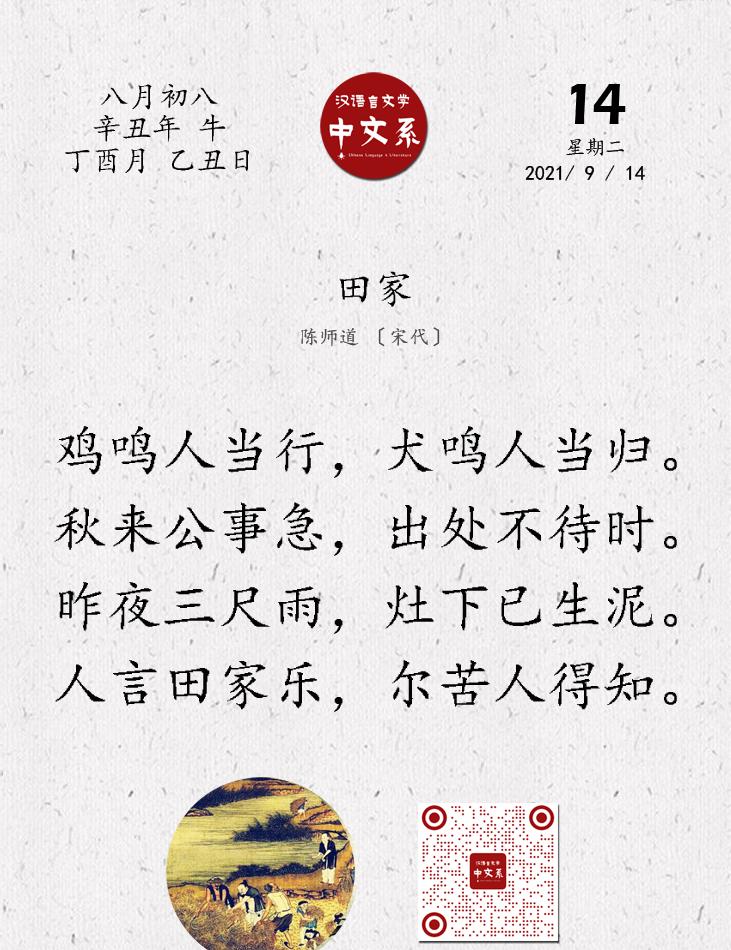
"Tian Jia" is a work created by the Song Dynasty poet Chen Shidao, and this poem mainly reflects the tragic suffering of peasants from the perspective of servitude. In the first two sentences, the common chicken and dog barking in the countryside are used to point out the daily life rules of the Tian family. Three or four sentences turned around, saying that since the autumn, the officials had forced the Tian family to serve in labor, and the daily life rules had been broken. The language of the poem is easy to understand and easy to read.
Translations
In the early morning, when the chickens are whining, people should travel, and the labor of the officials and families in the autumn is urgent.
Last night's heavy rain accumulated three feet of water, and people often say that the Tian family is happy.
When the sunset dog barks, the person should return, day and night.
A layer of mud has accumulated under the pot stove, and you know how to know the suffering of the Tian family.
exegesis
(1) Official affairs: refers to the service of public (official) service.
(2) Not waiting: not on time.
(3) Er: You, you, refer to the Tian family.
Appreciation
This poem does not escape the scope of the Yuan and Bai "Xinlefu Poems" in terms of theme, and it is also a call for the miserable living conditions of the peasants. Because Chen Shidao's life is closer to the people, his depiction of peasant life is more shocking. "Chicken Naruto should be a line, Dog Naruto Angelica" seems to write rural customs. Farmers work at sunrise and rest at sunset. The chicken whined and set off; the return alarmed the village watchdogs. This seems to be a rural genre painting. However, the two "dang" words were on the spot: this should have been the case, but because the recent "official" urging was too urgent, the peasants could no longer come and go on time.
"It rained three feet last night. The "three feet" in "mud under the stove" is exaggerated, describing the rain as particularly large. Farmers are afraid of planting crops, one is afraid of drought, and the other is afraid of floods. The "three-foot rain" is an exceptionally heavy rainstorm, enough to cause a flood. The poem does not write about the flood raging, but grasps a detail of life: the stove used for cooking, the silt gathered underneath, is completely damaged. Leaks washed down the stove and the flood swept in silt. The poet does not elaborate, but has already implied that the disaster was very serious. This family cannot cope with the famine. Their family may have no food left, and they will not be able to repair the house destroyed by the rainwater. "People say Tian Jiale. Erbi is known. The poet replied with these two sentences. Officials who do not understand the suffering of the peasants always have an illusion of "Tian Jiale" in their eyes, but no one knows the suffering of the peasants.
Creative background
In feudal society, taxation and servitude were the two basic forms of brutal exploitation of the peasantry by the landlord class regime. The poet wrote a poem exposing the suffering of the peasants caused by heavy labor.
Chen Shidao (1053–1102) was a Northern Song Dynasty official and poet. Characters are often used, wordless, houshan residents, Han chinese, Pengcheng (present-day Xuzhou, Jiangsu) people. YuanYou Chu Su Shi and others recommended his literary practice, starting as Xuzhou Professor, Li Shi Taixue Doctor, Yingzhou Professor, Secretary Provincial Zhengzi. A life of poverty and happiness, closed door bitter groaning, there is a "closed door to find a sentence Chen Wu self". Chen Shidao is one of the Six Gentlemen of Sumen and an important writer of the Jiangxi Poetry School. It is also a word, and its word style is similar to that of poetry, and it is known for its sharp alarm. However, his poems and words have the disease of narrow content and difficult meaning. He is the author of "The Collection of Mr. Houshan", and the words are "Houshan Words".